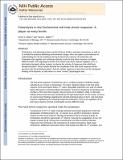Proteolysis in the Escherichia coli heat shock response: a player at many levels
Author(s)
Meyer, Anne S.; Baker, Tania
DownloadBaker_Proteolysis in.pdf (92.43Kb)
PUBLISHER_CC
Publisher with Creative Commons License
Creative Commons Attribution
Terms of use
Metadata
Show full item recordAbstract
Proteolysis is a fundamental process used by all forms of life to maintain homeostasis, as well as to remodel the proteome following environmental changes. Here, we explore recent advances in understanding the role of proteolysis during the heat shock response of Escherichia coli. Proteolysis both regulates and contributes directly to and the heat shock response at multiple different levels, from adjusting the levels of the master heat shock response regulator (σ[superscript 32]), to eliminating damaged cellular proteins, to altering the activity of chaperones that refold heat-denatured proteins. Recent results illustrate the complexity of the heat shock response and the pervasive role that proteolysis plays in both the cellular response to heat shock and the subsequent limiting of the response, as cells return to a more ‘normal’ physiological state.
Date issued
2011-02Department
Massachusetts Institute of Technology. Department of BiologyJournal
Current Opinion in Microbiology
Publisher
Elsevier
Citation
Meyer, Anne S, and Tania A Baker. “Proteolysis in the Escherichia Coli Heat Shock Response: a Player at Many Levels.” Current Opinion in Microbiology 14, no. 2 (April 2011): 194–199.
Version: Author's final manuscript
ISSN
13695274